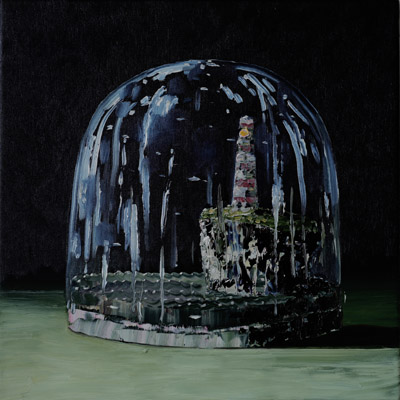Leyland Kirby’s The Caretaker moniker was named after Jack Nicholson’s character in Stanley Kubrick’s The Shining and takes its atmospheric cues from the haunted ballroom at that film’s center. It’s a theme that has remained with the project since its inception with 1999’s Selected Memories From the Haunted Ballroom and 2001’s masterful A Stairway to the Stars. It makes sense that The Caretaker’s handful of releases have remained so consistent. Kirby has enough monikers and enough releases under each to claim he’s been aurally mapping out every room in the Overlook Hotel and has already taken each to its logical conclusion.
With more recent releases, Kirby’s interests have taken The Caretaker project toward an exploration of deteriorating memories, constructing cobwebbed loops from battered 78s with an emphasis on their decayed state. On last year’s excellent An Empty Bliss Beyond This World the lead instrument, in a sense, was the comforting crackle of old vinyl while elsewhere unwinding parlor room pianos, strings, and woodwinds crumbled into dust. Bliss proved to be a critical success and Kirby’s most celebrated work to date. However, what’s been infrequently discussed is how precarious the impact of The Caretaker’s approach is on a track-by-track basis. Bliss worked so often because it managed to consistently capture the beauty and tension in the space between the origins of Kirby’s source material and the place – nearly three-quarters of a century later – we’re now hearing it. But there’s a fine line between the music of decay and something that just sounds like decaying music.
Even with the triumph of An Empty Bliss Beyond This World, there was an undeniable novelty to the record. The success of each track was predicated on how each loop took to manipulation. Arrangement was minimal and Kirby remained as much of a ghost in the production as the ones inhabiting the ballroom for which The Caretaker was named. And while Burial has turned vinyl crackle into a production staple in 2012, ubiquitous enough to make its way onto records like Born To Die, the crackle of those 78s was prominent enough to be one of Bliss‘ deciding factors. As with much of Kirby’s music, it was an album that was perhaps more enjoyable for those, admittedly like myself, who love the unique tactile nature of individual sounds as much as their musical arrangement.
Patience (After Sebald), a soundtrack for a film of the same name by English independent filmmaker Grant Gee, arrives less than a year after The Caretaker’s ‘breakout’ record, continuing much of the same sound with a few pallet swaps. Kirby is mining eighty year old loops from composer Franz Schubert, hiss has mostly replaced crackle, the tension in the Englishman’s manipulation has heightened, and the overall tone has darkened to a similarly colored hue as earlier work from The Caretaker name. But Patience is a little uneven. There’s a pedantic flatness that crops up in a couple places where the loops simply feel stilted, the musical dynamic of decay lost and all that’s left is the lifelessness of age. Admittedly, that might be the point as part of the concept is to mimic the effect of losing grasp on memory in old age, but it doesn’t always make for the most exciting listening. Especially when the high points of Patience carry so much gravity.
Much of the record is truly great. “Approaching the Outer Limits of our Solar System” sounds like a gentle landscape being crushed by a slowly descending concussion wave viewed from a distance. “In the Deep Dark Hours of the Night” could soundtrack a paranoid wanderer’s stroll through low-lit back alleys as city lights go out around him. And tracks like “No One Knows What Shadowy Memories Haunt Them to this Day” and closer “Now the Night is Over and the Dawn is About to Break” with their cavernous, austere vocal samples have a slowly-revealed darkness that’s as scary as anything on A Stairway to the Stars. But elsewhere, tracks like “The Homesickness the Was Corroding Her Soul” and “Increasingly Absorbed in His Own World” with their plodding piano loops sidle around like lost Alzheimer’s patients (again, that being the point) without really capturing the inherent tragedy there. Both tracks share the shuffling pace and stop-start huffs found on much of The Caretaker’s recent work – it may simply be that the loops themselves here just aren’t as interesting. It speaks, again, to the knife’s edge these tracks balance upon.
Kirby doesn’t stay in one place for long. And his work is so conceptual and fundamentally experimental that it’s hard to come to any conclusions in an album review. The Caretaker certainly remains a fascinating and worthwhile project. Patience (After Sebald) might feel a little slight in places, but it helps that we can probably expect another Caretaker record within the next twelve months.

